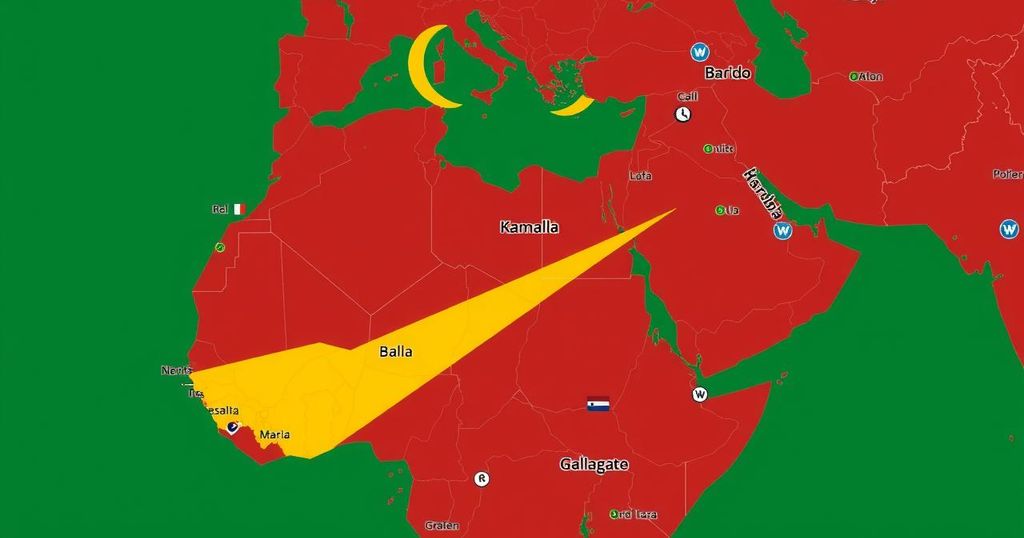Allegations of Zimbabwean Interference in Regional Elections Spark Controversy in Southern Africa
Zimbabwe’s ruling party, Zanu-PF, faces allegations of meddling in elections of neighboring countries, including Botswana, Namibia, and Mozambique, as opposition groups claim it is providing support to local parties to influence electoral outcomes. The Zimbabwe government denies these accusations, asserting its involvement is limited to collaboration with democratically elected governments and regional observer roles.
Zimbabwe’s ruling party, Zanu-PF, is under scrutiny for alleged interference in the electoral processes of its neighboring countries, particularly in Botswana, Namibia, and Mozambique. Opposition groups have accused Zanu-PF of deploying campaign teams to assist local ruling parties in these nations, igniting controversy amid claims that Zimbabwe seeks to maintain its influence in the region. In Mozambique, Zanu-PF engaged in activities to support the Front for the Liberation of Mozambique (Frelimo), including facilitating campaign rallies that were held in Zimbabwe for Frelimo’s diaspora voters ahead of the disputed October 9 elections. Reports indicate that some Zanu-PF members participated in Mozambique’s voting process, exploiting the diaspora voting system available to the large Mozambican population residing in Zimbabwe. In Botswana, Zanu-PF officials reportedly campaigned alongside the ruling Botswana Democratic Party (BDP) ahead of elections scheduled for October 30, while Namibia’s opposition expressed displeasure with a South African company involved in printing ballots for their elections, alleging links to Zimbabwe’s leadership. The Zanu-PF government has asserted its role in promoting cooperation among liberation movements within the Southern African Development Community (SADC) to counter perceived neo-colonial threats. Former Botswana President Ian Khama has been a vocal critic of Zimbabwe’s involvement, articulating concerns that Zanu-PF’s actions could undermine Botswana’s sovereignty. Furthermore, Job Sikhala, a prominent opposition voice from Zimbabwe, has urged SADC to act against what he described as Zimbabwe’s blatant interference. In response to these allegations, Nick Mangwana, spokesperson for the Zimbabwean government, refuted accusations of meddling, insisting on Zimbabwe’s commitment to collaborate only with democratically elected governments. He emphasized that Zimbabwe participates in regional elections as observers and stressed that while the country possesses significant clout, it does not dictate governance in the region. Complications in regional diplomacy are exacerbated by past accusations against Zimbabwe, including allegations of attempts to influence Zambian elections and President Mnangagwa’s controversial comments regarding Zambia’s relationship with western nations. Additionally, criticisms have arisen over Mnangagwa’s premature congratulations to Frelimo on their electoral success, before official results were published, prompting further scrutiny from opposition parties in Mozambique who claim electoral manipulation. As the current chair of SADC, Zimbabwe may face pressure to mediate these electoral disputes within the region, yet its own conduct has raised significant concerns regarding its influence across Southern Africa.
The backdrop of this issue lies in the historical context of Zimbabwe’s political landscape, characterized by Zanu-PF’s long-standing dominance as one of the few remaining liberation movements still in power. Following the end of colonial rule, Zimbabwe has sought to establish close ties with other liberation parties in Southern Africa to foster regional solidarity and mutual support. However, these relationships have increasingly drawn criticism, particularly as they pertain to electoral processes in neighboring countries. The ongoing political dynamics in Botswana, Namibia, and Mozambique exemplify the tensions surrounding perceived foreign interference, especially in an era when democracy in the region faces multiple challenges, including allegations of electoral misconduct and external influence.
The situation in Southern Africa regarding Zimbabwean influence in regional elections reflects deep-seated tensions and varying perceptions of sovereignty. Allegations of Zanu-PF’s interference raise critical questions about electoral integrity and the balance of power among neighboring states. As Zimbabwe asserts its leadership role within SADC while facing accusations of undue influence, the dynamics of regional politics will continue to evolve, necessitating careful observation and potential intervention to uphold democratic principles across the region.
Original Source: www.theeastafrican.co.ke




Post Comment